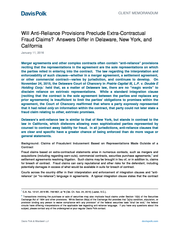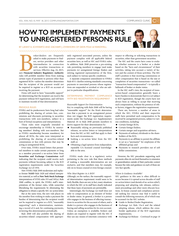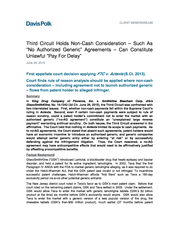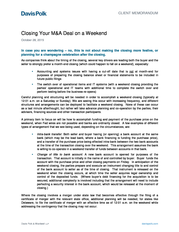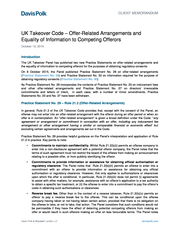Will Anti-Reliance Provisions Preclude Extra-Contractual Fraud Claims? Answers Differ in Delaware, New York, and California - January 11, 2016
Davis Polk & Wardwell
Description
interest in applying its own law and the chosen law would contravene California’s fundamental
public policy. 30
The practical takeaway? If you are seeking to preclude fraud claims based on matters outside of a
contract, then: (i) draft anti-reliance language as explicitly and specifically as possible; (ii) where the
parties have a nexus to Delaware or to New York, consider selecting either state’s law (and avoid
selecting California law) to govern the agreement; and (iii) consider identifying a state other than
California as the exclusive forum for dispute resolution.
If you have any questions regarding the matters covered in this publication, please contact any of the
lawyers listed below or your regular Davis Polk contact.
Menlo Park
Neal A. Potischman
650 752 2021
neal.potischman@davispolk.com
Stephen Salmon
650 752 2063
stephen.salmon@davispolk.com
Alyse L. Katz
650 752 2099
alyse.katz@davispolk.com
John A.
Bick 212 450 4350 john.bick@davispolk.com Kirtee Kapoor 212 450 4746 kirtee.kapoor@davispolk.com Lawrence Portnoy 212 450 4874 lawrence.portnoy@davispolk.com New York © 2016 Davis Polk & Wardwell LLP | 450 Lexington Avenue | New York, NY 10017 This communication, which we believe may be of interest to our clients and friends of the firm, is for general information only. It is not a full analysis of the matters presented and should not be relied upon as legal advice. This may be considered attorney advertising in some jurisdictions.
Please refer to the firm's privacy policy for further details. 30 See, e.g., Abat v. Chase Bank USA, N.A., 738 F. Supp.
2d 1093, 1095 (C.D. Cal. 2010).
A detailed analysis of choice of law issues in California is beyond the scope of this memorandum, but it is important to understand that a California court’s willingness to enforce a choice of law provision in a contract (a) specifying another state’s laws and (b) involving an anti-reliance provision is likely to depend on the specific facts and circumstances in a given case. Davis Polk & Wardwell LLP 6 .
Bick 212 450 4350 john.bick@davispolk.com Kirtee Kapoor 212 450 4746 kirtee.kapoor@davispolk.com Lawrence Portnoy 212 450 4874 lawrence.portnoy@davispolk.com New York © 2016 Davis Polk & Wardwell LLP | 450 Lexington Avenue | New York, NY 10017 This communication, which we believe may be of interest to our clients and friends of the firm, is for general information only. It is not a full analysis of the matters presented and should not be relied upon as legal advice. This may be considered attorney advertising in some jurisdictions.
Please refer to the firm's privacy policy for further details. 30 See, e.g., Abat v. Chase Bank USA, N.A., 738 F. Supp.
2d 1093, 1095 (C.D. Cal. 2010).
A detailed analysis of choice of law issues in California is beyond the scope of this memorandum, but it is important to understand that a California court’s willingness to enforce a choice of law provision in a contract (a) specifying another state’s laws and (b) involving an anti-reliance provision is likely to depend on the specific facts and circumstances in a given case. Davis Polk & Wardwell LLP 6 .
Regulations Presentations
+
Regulations Sub Categories


